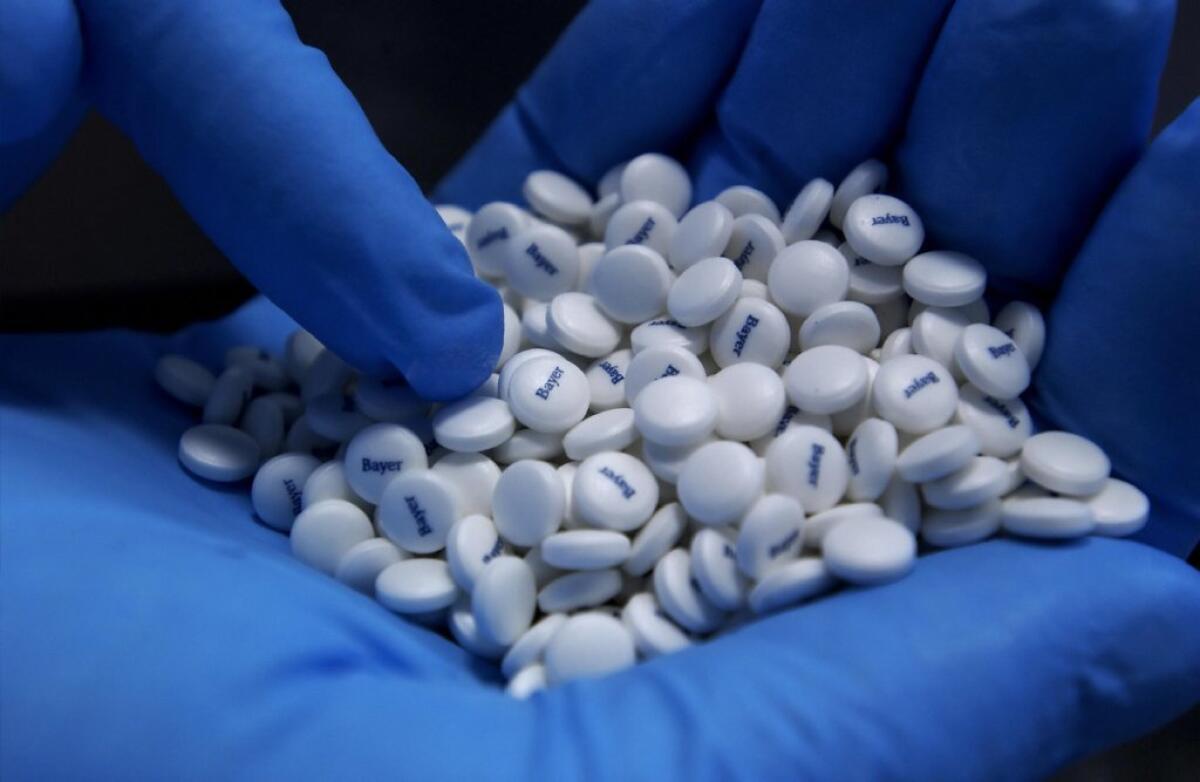A daily dose of aspirin appears to cut the risk of a common type of cancer

In a new study, people who took aspirin or certain other NSAID painkillers for at least five years were less likely than their peers to be diagnosed with colorectal cancer.
- Share via
Colorectal cancer is one of the most common types of cancer, and researchers say they have found a way to reduce one’s risk of it by up to 45% – by taking aspirin, Advil, Motrin, Aleve or certain other painkillers.
A new study finds that people who took 75 to 150 milligrams of aspirin every day for at least five years were 27% less likely to be diagnosed with colorectal cancer than people who didn’t. (A tablet of regular Bayer aspirin, for instance, contains 325 mg of aspirin. The low-dose version designed to reduce the risk of a recurrent heart attack of stroke contain 81 mg of aspirin.)
Other types of nonsteroidal anti-inflammatory drugs, or NSAIDs, appeared to reduce the risk even more. People who took non-aspirin NSAIDs for at least five years were 30% to 45% less likely to have colorectal cancer than those who didn’t take the painkillers. Ibuprofen (the active ingredient in Advil and Motrin, among others) and naproxen (the active ingredient in Aleve) are two examples of this type of NSAIDs.
The results appear in the Sept. 1 edition of the Annals of Internal Medicine.
Previous studies have suggested that regular use of aspirin or other NSAIDs may help protect against colorectal cancer. But the studies didn’t provide clear answers on the ideal dose to see a protective effect or how long someone would need to take it.
So the researchers turned to data from Denmark to find 10,280 adults from the northern part of the country who were diagnosed with colorectal cancer between 1994 and 2011. For each patient, the researchers also identified 10 “controls” – adults who shared the same birth year and gender and lived in the same area but did not have colorectal cancer.
In addition, the researchers used national databases to figure out which prescription drugs all of these people had taken. More than 90% of the low-dose aspirin sold in Denmark is prescribed by doctors, along with about 85% of non-aspirin NSAIDs. (The rest are sold over the counter, making them more difficult to track.)
The patients diagnosed with colorectal cancer were slightly less likely than the controls to have had a colonoscopy, 4.5% versus 7.5%. Other than that, the two groups were similar in most ways.
Compared with those who never took aspirin at all, those who had filled prescriptions at least twice were 6% less likely to be diagnosed with colorectal cancer. But to get a more substantial benefit from low-dose aspirin, people had to take it for five years or more. Their risk was 27% lower than for their counterparts who eschewed the drug.
Other NSAIDs provided an even greater benefit. People who took a “high-intensity” dose of the painkillers for at least five years were at least 30% less likely to be diagnosed with colorectal cancer, and those who took newer type of stomach-protecting NSAIDs (such as Celebrex) that block only production of COX-2 enzymes were 43% less likely to get the disease. A dose was considered high-intensity if it was about three times higher than the median dose for people in the study.
The researchers were not able to control for factors like diet, alcohol use and body mass index, all of which may contribute to one’s risk of colorectal cancer. Nor could they tell whether people in the study had a family history of the disease.
Still, the researchers wrote that there were good reasons to think that aspirin and other NSAIDs could help prevent colorectal cancer. The drugs block production of a chemical called prostaglandin, which helps colon cancer spread.
“The biological plausibility of our findings is high,” they wrote.
Colorectal cancer is the fourth most common type of non-skin cancer in the U.S., after lung, breast and prostate cancers, according to the National Cancer Institute. An estimated 132,700 Americans are diagnosed with colorectal cancer each year, and 49,700 die from it.
Worldwide, nearly 1.4 million cases of colorectal cancer are diagnosed each year, making it the third-most common type of non-skin cancer, according to a recent study in the International Journal of Cancer.
Follow me on Twitter @LATkarenkaplan and “like” Los Angeles Times Science & Health on Facebook.






